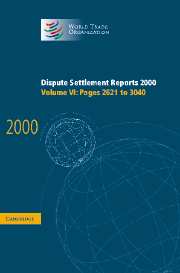Book contents
- Frontmatter
- Contents
- United States - Imposition of Countervailing Duties on Certain Hot-Rolled Lead and Bismuth Carbon Steel Products Originating in the United Kingdom (WT/DS138): Report of the Panel
- Canada - Certain Measures Affecting the Automotive Industry (WT/DS139, WT/DS142): Report of the Appellate Body
United States - Imposition of Countervailing Duties on Certain Hot-Rolled Lead and Bismuth Carbon Steel Products Originating in the United Kingdom (WT/DS138): Report of the Panel
Published online by Cambridge University Press: 22 December 2017
- Frontmatter
- Contents
- United States - Imposition of Countervailing Duties on Certain Hot-Rolled Lead and Bismuth Carbon Steel Products Originating in the United Kingdom (WT/DS138): Report of the Panel
- Canada - Certain Measures Affecting the Automotive Industry (WT/DS139, WT/DS142): Report of the Appellate Body
Summary
INTRODUCTION
On 12 June 1998, the European Communities requested consultations with the United States pursuant to Article 4 of the Understanding on Rules and Procedures Governing the Settlement of Disputes (DSU), Article XXII:1 of the General Agreement on Tariffs and Trade 1994 (GATT 1994) and Article 30 of the Agreement on Subsidies and Countervailing Measures (SCM Agreement) with respect to the imposition of countervailing duties by the United States on certain hot-rolled lead and bismuth carbon steel products (leaded bars) originating in the United Kingdom in the context of three successive annual reviews (WTO document WT/DS138/1). The European Communities and the United States held consultations on 29 July 1998, but failed to reach a mutually satisfactory solution.
On 14 January 1999, pursuant to Articles 4 and 6 of the DSU, Article XXIII of the GATT 1994 and Article 30 of the SCM Agreement, the European Communities requested the establishment of a panel with respect to the imposition of countervailing duties by the United States on certain hot-rolled lead and bismuth carbon steel products originating in the United Kingdom in the context of three successive annual reviews (WTO documents WT/DS138/3 and WT/DS138/3/Corr.1).
At its meeting on 17 February 1999, the Dispute Settlement Body (DSB) established a panel pursuant to the above request. At that meeting, the parties to the dispute agreed that the Panel should have standard terms of reference. The terms of reference were:
“To examine, in light of the relevant provisions of the covered agreements cited by the European Communities in documents WT/DS138/3 and WT/DS138/3/Corr.1, the matter referred to the DSB by the European Communities in that document and to make such findings as will assist the DSB in making the recommendations or in giving the rulings provided for in those agreements”.
On 16 March 1999, the Panel was constituted as follows:
Chairman: Mr. Ole Lundby
Members: Mr. Paul O'Connor
Mr. Arie Reich
Brazil and Mexico reserved their rights as third parties to the dispute.
The Panel met with the parties on 15-16 June 1999 and 14-15 July 1999. It met with the third parties on 16 June 1999.
- Type
- Chapter
- Information
- Dispute Settlement Reports 2000 , pp. 2623 - 2984Publisher: Cambridge University PressPrint publication year: 2002
- 2
- Cited by



